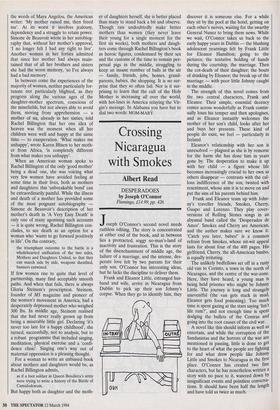Crossing Nicaragua with Smokes
Albert Read
DESPERADOES by Joseph O'Connor Flamingo, f14.99, pp. 426 Joseph O'Connor's second novel needs ruthless editing. The story is concentrated at either end of the book, and in between lies a protracted, soggy no-man's-land of inactivity and frustration. This is the story of the disenchantment of middle age, the failure of a marriage, and the intense, des- perate love felt by two parents for their only son. O'Connor has interesting ideas, but he lacks the discipline to deliver them.
Frank and Eleanor Little, estranged hus- band and wife, arrive in Nicaragua from Dublin to pick up their son Johnny's corpse. When they go to identify him, they discover it is someone else. For a while they sit by the pool at the hotel, getting on each other's nerves, waiting for the swarthy General Nunez to bring them news. While we wait, O'Connor takes us back to the early happy years in Dublin — the blushing adolescent yearnings felt by Frank Little for Eleanor Hamilton; going to the pictures; the tentative holding of hands during the courtship, the marriage. Then the cot-death of their daughter; the bouts of drinking by Eleanor; the break up of the marriage — with poor little Johnny caught in the middle.
The strength of this novel comes from the two central characters, Frank and Eleanor. Their simple, essential decency comes across wonderfully as Frank contin- ually loses his temper and then apologises, and as Eleanor instantly welcomes the mother of her son's child, looks after her and buys her presents. These kind of people do exist, we feel — particularly in Ireland.
Eleanor's relationship with her son is unresolved — plagued as she is by remorse for the harm she has done him in years gone by. The desperation to make it up with her child — a figure whose life becomes increasingly crucial to her own as others disappear — contrasts with the cal- lous indifference of the son, twisted with resentment, whose aim it is to move on and put the sins of his parents behind him.
Frank and Eleanor team up with John- ny's traveller friends, Smokes, Cherry, Guapo and Lorenzo. They play cover- versions of Rolling Stones songs in an abysmal band called the 'Desperados de Amor'. Smokes and Cherry are American, and the author makes sure we know it: `Catch you later, babes!' is a common refrain from Smokes, whose nit-wit appeal lasts for about four of the 400 pages. His girlfriend, Cherry, the all-American bimbo, is equally irritating.
The unlikely bedfellows set off in a rusty old van to Corinto, a town in the north of Nicaragua, and the centre of the war-zone. Here, they have heard, a young man is being held prisoner who might be Johnny Little. The journey is long and strangely uneventful (the van gets stuck in mud, Eleanor gets food poisoning). Too much time is spent gazing at the stars saying 'Isn't life rum?', and not enough time is spent dodging the bullets of the Contras and going into the root causes of the civil war.
A novel like this should inform as well as entertain, and while the corruption of the Sandanistas and the horrors of the war are mentioned in passing, little is done to get to the heart of what the people are fighting for and what drew people like Johnny Little and Smokes to Nicaragua in the first place. O'Connor has created two fine characters, but he has nonetheless written a story with no pace to it, watered down by insignificant events and pointless conversa- tions. It should have been half the length and have told us twice as much.


















































 Previous page
Previous page